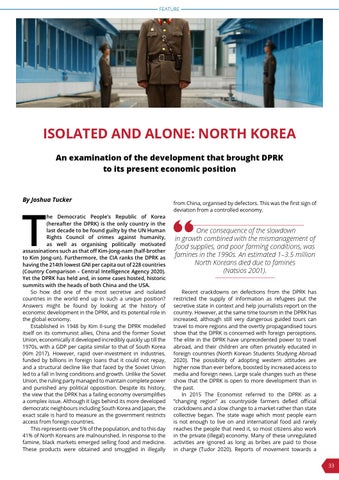FEATURE
ISOLATED AND ALONE: NORTH KOREA An examination of the development that brought DPRK to its present economic position
By Joshua Tucker
T
he Democratic People’s Republic of Korea (hereafter the DPRK) is the only country in the last decade to be found guilty by the UN Human Rights Council of crimes against humanity, as well as organising politically motivated assassinations such as that off Kim-Jong-nam (half-brother to Kim Jong-un). Furthermore, the CIA ranks the DPRK as having the 214th lowest GNI per capita out of 228 countries (Country Comparison – Central Intelligence Agency 2020). Yet the DPRK has held and, in some cases hosted, historic summits with the heads of both China and the USA. So how did one of the most secretive and isolated countries in the world end up in such a unique position? Answers might be found by looking at the history of economic development in the DPRK, and its potential role in the global economy. Established in 1948 by Kim Il-sung the DPRK modelled itself on its communist allies, China and the former Soviet Union, economically it developed incredibly quickly up till the 1970s, with a GDP per capita similar to that of South Korea (Kim 2017). However, rapid over-investment in industries, funded by billions in foreign loans that it could not repay, and a structural decline like that faced by the Soviet Union led to a fall in living conditions and growth. Unlike the Soviet Union, the ruling party managed to maintain complete power and punished any political opposition. Despite its history, the view that the DPRK has a failing economy oversimplifies a complex issue. Although it lags behind its more developed democratic neighbours including South Korea and Japan, the exact scale is hard to measure as the government restricts access from foreign countries. This represents over 5% of the population, and to this day 41% of North Koreans are malnourished. In response to the famine, black markets emerged selling food and medicine. These products were obtained and smuggled in illegally
from China, organised by defectors. This was the first sign of deviation from a controlled economy.
One consequence of the slowdown in growth combined with the mismanagement of food supplies, and poor farming conditions, was famines in the 1990s. An estimated 1–3.5 million North Koreans died due to famines (Natsios 2001). Recent crackdowns on defections from the DPRK has restricted the supply of information as refugees put the secretive state in context and help journalists report on the country. However, at the same time tourism in the DPRK has increased, although still very dangerous guided tours can travel to more regions and the overtly propagandised tours show that the DPRK is concerned with foreign perceptions. The elite in the DPRK have unprecedented power to travel abroad, and their children are often privately educated in foreign countries (North Korean Students Studying Abroad 2020). The possibility of adopting western attitudes are higher now than ever before, boosted by increased access to media and foreign news. Large scale changes such as these show that the DPRK is open to more development than in the past. In 2015 The Economist referred to the DPRK as a “changing region” as countryside farmers defied official crackdowns and a slow change to a market rather than state collective began. The state wage which most people earn is not enough to live on and international food aid rarely reaches the people that need it, so most citizens also work in the private (illegal) economy. Many of these unregulated activities are ignored as long as bribes are paid to those in charge (Tudor 2020). Reports of movement towards a 33
